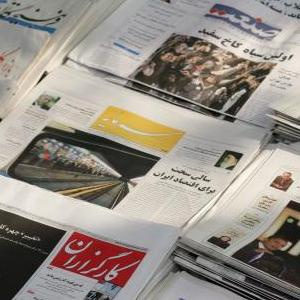Tehran's Daily Newspaper Review

For its top headline, Iran interviewed experts about the Justices Shares, agricultural imports and inflation, the main subjects of the recent criticisms against Ahmadinejad's economic policies. “Privatization tallies with social justice in Iran according to international experts”, “Justice Shares’ critics wish national wealth not to be distributed among the citizens” and “same plans have been implemented in Japan” supporters of the government’s policies uttered. Another group of ‘experts’ supported the government’s suggestion to call Thursdays off, arguing that “Thursdays are an opportunity to consolidate the foundations of family.” Iran's editorial, the only editorial actually written by the editor-in-chief, was a response to the recent remarks by Ahmad Salek, Speaker of the Combatant Clergy Association, in which the hojjat-ol-eslam had criticized both Ahmadinejad and Mashaei.
Expert opinions, nonetheless, did not persuade Majles’ Speaker Ali Larijani not to express his concerns about the state of production and industries and criticize “distributing money in the name of justice” by the government in his meeting with members of Iran's main chamber of commerce. Jomhouri-e Eslami also reflected Hashemi Rafsanjani’s concern with brain drain, which he expressed in a meeting with a number of elite Iranian students. Rafsanjani blamed the immigration of the Iranian educated, or “brilliant talents” as they are called here, on the behavior of some officials and policy-makers.
The trial of the Egyptian tyrant, Husni Mubarak, “the dictator in cage” according to Kayhan, will start from Wednesday, to realize the revolutionaries’ key demand. The tussle between the military and AKP in Turkey was deemed as “an end to the rule of the laic Army in Turkey” by Kayhan. Kayhan also covered the memorial held for victims of Norway’s massacre in Oslo’s major mosque and indictment of four “economic corrupts” by the judiciary.
Shargh’s pointed headline spoke of 33 billion dollars of compensation paid by Baghdad to Kuwait for its invasion of the country in 1991 while picking out “Confusion in Iran receiving compensation from Iraq”. Warning about the spread of superstitious religious beliefs by a religious leader, namely Ayatollah Mousavi Ardebili, possible price increase on the threshold of Ramadan and Gen. Firouzabadi’s warning about electoral usage of subsidies and Justice Shares were the other headlines appearing on Shargh’s front page. “Negotiations with the US, May Be Another Time” was the title of newspaper’s editorial written by Hassan Danaeifar, Iran's Ambassador to Iraq. Danaeifar wrote that Iran welcomes negotiations with any country except Israel, but with US failing to keep its promises after the previous negotiations in Iraq, Tehran hesitates to enter another round of talks.
Tehran-e Emrooz quoted Speaker of the Guardian Council, body in charge of qualifying electoral candidates, that parliamentary nominees should be proven qualification to run for the Majles’ poll coming up in six months. A pessimistic translation would be that by default, parliament hopefuls are not eligible to run for the elections. Tehran-e Emrooz also ran a report on five cases of embezzlements in Iranian banks. A conservative member of Majles’ Judicial Committee, Mousa Ghorbani, has suggested passing a bill to criminalize ‘blackening’ by the media, which found themselves the prime suspect following the recent controversial cases of violence in Tehran and other cities. With Mashaei withdrawing from the spotlight, the media have switched from accusations of sorcery by senior governmental officials towards Ahmadinejad's economic policies. Tehran-e Emrooz’ editorial elaborated on “deviations” by the government from the privatization polices, arguing that 86% of privatization cases have benefited the quasi-governmental organizations, while the private sector has received an insignificant 14% share.
“Will removing zeros from the national currency transform the banking system” asked Vatan-e Emrooz. The newspaper comprehensively analyzed the government’s firm decision to remove four zeros from the national currency and give the new unit of money a different name. Ahmadinejad's speech in the third “Media Prospect” conference held by the state-run national TV also attracted coverage. Ahmadinejad praised the productive record of the institution, adding that various tastes and different demands give Seda-va-Sima hard times.
* Note: Vatan-e Emrooz does not publish on Thursdays.
Trouble with understanding some terms? Check our Glossary of Iranian Political Terms.
Briefing
Hamshahri (Citizen) is the official daily newspaper of Tehran's Municipality. Its general directions in politics, culture and economy are determined by the mayor of Tehran, currently Mohammad Baqer Qalibaf.
Iran is the official organ of the administration.
Jomhouri-ye Eslami (The Islamic Republic) was known as the official organ of the Party of the Islamic Republic, founded in 1979 and disbanded in 1987. Currently, it is an open critique of Mahmoud Ahmadinejad's policies and is known to be a mouthpiece of Akbar Hashemi Rafsanjani.
Kayhan (Universe) is a hard-line conservative newspaper. Its editor-in-chief –currently Hossein Shari’atmadari- is appointed by Iran's Supreme Leader. Shari’atmadari’s editorials often spark off controversy and debate inside Iranian political circles.
Khabar (News) is a principlist daily newspaper which adopts a critical stance towards Ahmadinejad's policies.
Resalat (Mission) belongs to the moderate wing of the principlist camp. Resalat’s best known analyst is Amir Mohebbian, its political editor.
Shargh (East) is a moderate reformist newspaper. It was the most popular and influential reformist newspaper in its first period of publication which lasted from August 2003 until September 2006.
Tehran-e Emrooz (Tehran Today) is a ‘principlist reformist’ newspaper, connected to Mohammad Baqer Qalibaf.

